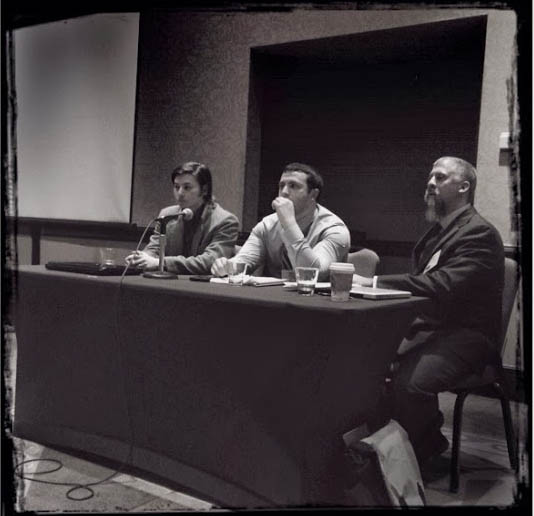 Star Wars fans and gamers rejoice: The Force may indeed be with you.
Star Wars fans and gamers rejoice: The Force may indeed be with you.
Robert M. Geraci, Ph.D., associate professor of religious studies, and civil engineering major Nat Recine ’14 recently discovered the potential real-world value of the multiplayer online role-playing game Star Wars: The Old Republic (SWTOR), which they discussed at the Southwest Popular/American Culture Association’s annual conference, held in Albuquerque, N.M., Feb. 19-22.
Their co-written paper, “Enlightening the Galaxy: How Players Experience Political Philosophy in Star Wars: The Old Republic,” examines the way gamers experience the enlightenment-era political battle between totalitarian rule — championed by philosopher Thomas Hobbes — and republicanism — advocated by philosophers Jean-Jacques Rousseau and Immanuel Kant — by playing SWTOR. In SWTOR, players join the Empire or the Republic and, thereby, struggle to make sense out of the galactic war between the two communities.
“We have found that the players not only recognize the key political ideologies underlying these two factions, but that they find working through the political debates is a significant part of the fun of the game,” Geraci says. In addition, survey respondents and interviewees indicate that “they can use their in-game experiences to reflect upon real-world political situations.”
Currently under peer review, the paper is part of a National Science Foundation (NSF) award, “EAGER – Virtually Meaningful: The Power and Presence of Meaning in Virtual Worlds,” which was awarded in July 2011. This project explores the ways in which massively multi-participant online interactions provide experiences of meaningful accomplishment and how this engagement may portend the social use of digital technology for mass persuasion and motivation.
In search of a broad interdisciplinary perspective, Geraci has called together interested students from a variety of academic majors, from engineering to sociology.
“Having a civil engineering background was beneficial in the sense that it is very scientific,” says Recine. “I was able to analyze how things work and discover something that’s different from the normal projects I’m given in the engineering field. It was really interesting to see the conflicting viewpoints and research of another academic field and moreover, be involved in it.”
This is the second paper to be presented by a student as part of the project. In July 2012, Daniela Robles ’12, a sociology major and fellow Virtually Meaningful collaborator, presented “Dying to Play: How Death Mechanics in Guild Wars” at the 2012 International Conference on Videogame Cultures and the Future of Interactive Entertainment at Oxford University. Her paper was published in Cultural Perspectives of Video Games (Inter-Disciplinary Press, 2012).
These forays into the world of academia are not only opportunities for students like Robles and Recine to practice their presentation skills; they’re also a chance to be challenged, to explore new topics and to network with fellow researchers from different institutions.
“To finally see the work we completed be presented and receive feedback from colleagues was a unique and wonderful experience,” says Recine of his participation in the recent conference. “It was also a joy seeing what the other students had been researching and working on.”
Discover more about Academics at Manhattan College.
 Star Wars fans and gamers rejoice: The Force may indeed be with you.
Star Wars fans and gamers rejoice: The Force may indeed be with you.